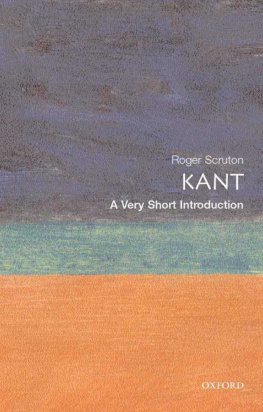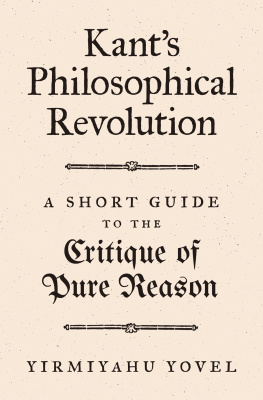Immanuel Kant: A Guide toTranscendental Idealism
Copyright 2014 by M. James Ziccardi
Smashwords Edition
Cover Art by Emil Doerstling (1900)
Section 1- Biography of Immanuel Kant
Immanuel Kant was born onApril 22, 1724 in the Baltic port city of Knigsberg, then thecapital of the German Province of East Prussia. At the end of WorldWar II, the city was renamed to Kaliningrad after the Soviet Unionhad captured it from the Nazis. It is now part of the RussianFederation. By all accounts, Kant lived a rather uneventful yethighly regimented life, which might seem surprising for someonewhose ideas would prove to be so instrumental in the shaping of allsubsequent Western thought. He neither married nor had anychildren. In fact, aside from a handful of his brighter formerstudents, of whom he maintained regular correspondences, and a fewfellow faculty members at the University of Knigsberg, Kant livedhis entire adult life essentially friend free. It appears, however,that this did not negatively affect Kant, for he was often fond ofquoting Aristotle, telling his associates, My friends, I have nofriends. Nonetheless, despite his solitary adult life, Kant wasnot an unhappy person, for it was his work that he loved and livedfor above all else. When he died in Knigsberg on February 12,1804, it was said that during his entire life he never travelledmore than forty miles from the place of his birth.
Kant was raised in a home ofpoverty and devout Pietism, an eighteenth-century Lutheranmovement, which, not unlike Puritanism, called for a zealousdisplay of individual piety and preached a strict devotion toChristian principles. Kants father, whose own father had emigratedfrom Scotland to East Prussia in the preceding century, was aleather worker by trade who struggled to make ends meet by makingstraps for horse harnesses. Although he was able to provide amodest living for his family, Kants fathers poor business skillsalways seemed to lead to financial hardship. Kants German mother,who herself had come from a family of saddle makers, was a whollyuneducated though highly intelligent woman. As such, she wouldprove to be young Immanuels greatest source ofinspiration.
Kant, who was baptized underthe name Emanuel, but later changed it to Immanuel after learningHebrew, was the fourth of the familys nine children. Thosesurviving past childhood include Kant, a younger brother who wouldlater go on to become a rather successful businessman, and threesisters. Throughout the whole of his adult life, Kant rarely metwith any of his siblings - a choice which, to the chagrin of hisfamily, was entirely his own. On one of the few occasions where itis reported that Kant met face to face with one of his sisters,Kant is said to have not even recognized her. After the encounter,Kant could only apologize to his associates for his familys lackof culture. Nevertheless, out of a strict sense of duty Kantwould send money to his sisters on a regular basis for the rest ofhis life.
Kants education beganinformally while he was still too young for school. His motherwould take him on long walks in the courtside where she would pointout to him and name all the plants, animals, and other facts ofnature they encountered along the way. As a devout Pietist, shealso took this time to instill in the young boy a deep sense ofmoral obligation. This combination of a love of knowledge and astrict reverence for person duty would become the cornerstone ofKants later philosophy. Between the ages of eight and sixteen,Kant attended a local Pietist school, which, above all else,stressed the importance of leading a devout Christian life.Consequently, it was during this same time that Kant developed anaversion towards all formal religion. And although he would remaina religious person throughout his life, Kant never attended churchservices from that point on. It was also during this time that in1737, when Kant was only thirteen years old, his mother died. Somehave claimed that the death of his mother was a primary factor inKants choosing to lead a solitary life.
At the age of eighteen, Kantwas admitted into the University of Knigsberg where he took up aneducation in theology. Although his education was financed for themost part by the local Pietist community, Kant was able to earnextra money while working as a tutor for some of his less acuteclassmates. Shortly after entering the University, however, Kantbegan to lose interest in theology and opted instead for the morechallenging fields of mathematics and physics. And following areading of Isaac Newtons monumental work on the subjects, Philosophae Naturalis PrincipiaMathematica ( Mathematical Principles of NaturalPhilosophy ), Kants new interests becamepermanent. Accordingly, Kants earlier ideas, which sprang from aneducation steeped in the traditions of the European rationalism,and particularly the metaphysics of German philosopher andmathematician Gottfried Leibniz, now began to give way to ideas ofempiricism. As we shall see later on, these ideas of Kant wouldburst forth upon a reading of Scottish philosopher David Humesfamous work, An Enquiry Concerning HumanUnderstanding (1748).
In 1746, when Kant wastwenty-two years old, his father died leaving the family in abjectpoverty. As such, Kants sisters were either taken in by otherfamilies or forced to accept menial jobs as house servants. As forhimself, Kant was left with no other option than to leave theUniversity before earning his degree. For the next nine years, Kantsupported himself by once again working as a tutor for some of themore wealthy families in and around Knigsberg. It was during thistime that Kant did his travelling, for it was often the case thathe was invited to accompany his clients on their summer holidays,sometimes venturing as far away as forty miles.
Although Kant never married,he was in fact twice engaged. But because he took so long in hisdeliberations, by the time he finally made up his mind to commit tothe marriage, both women had already chosen other options - one haddecided to marry someone else, and the other had decided to leaveKnigsberg altogether. However, with the money he was earning fromhis tutoring jobs and the fancy new cloths he has able to buy withit, Kant soon began to develop an air of sophistication. He enjoyedgoing to dinner parties with his colleagues and even acquired ataste for billiards and card playing. Thus, despite his somewhatawkward appearance - Kant was less than five feet tall with a headthat was not only too large for his body, but that always seemed totilt to one side - Kant was able, at least for a while, to enjoythe life of a socialite.
It wasnt until 1755 thatKant, at the rather late age of thirty-one, finally earned hisdegree from the University of Knigsberg. After graduating, he wasgiven the position of junior lecturer at the University. He wouldremain in that position for the next fifteen years. Still, it wouldnot be until nearly two decades later that Kant would develop hisown revolutionary philosophy. During his early years at theUniversity, Kant published works on a wide array of topics,including treatises on geography, astronomy, meteorology, andanthropology. As for philosophical matters, Kants earliestinfluences include the science of Newton, the rationalism ofLeibniz (although Kant would later come to reject it), and,surprisingly, the romanticism of French political philosopher,Jean-Jacques Rousseau. Despite all of this, however, it would bethe empiricism of Hume that would prove to be the most influentialof all.
In the years just prior tohis major philosophical breakthroughs, Kant was impacted to arather surprising extent by the writings of the somewhat famousSwedish mystic and extreme metaphysician, Emanuel Swedenborg(1688-1772). Swedenborg, who claimed not only to be able toconverse with the dead, but that through meditation he could strollthrough the streets of Heaven and Hell, had written an eight-volumework detailing his extreme form of metaphysics. Although the worksold poorly, Kant is one of the few to have purchased the entireset. As a rebuttal to the Swedenborgs claims, Kant anonymouslypublished a satirical book on the matter entitled Dreams of a Ghost-Seer, Illustrated by Those ofMetaphysics (1766) in which he savagelyattacked Swedenborgs allegations. Nonetheless, upon a reading ofthe book there can be no doubt that Swedenborgs extraordinaryclaims perplexed Kant to such a degree that it left him with anewfound respect for metaphysical beliefs in general.



